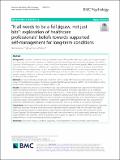Files in this item
"It all needs to be a full jigsaw, not just bits" : exploration of healthcare professionals' beliefs towards supported self-management for long-term conditions
Item metadata
| dc.contributor.author | Anderson, Niall | |
| dc.contributor.author | Ozakinci, Gozde | |
| dc.date.accessioned | 2019-06-27T10:30:05Z | |
| dc.date.available | 2019-06-27T10:30:05Z | |
| dc.date.issued | 2019-06-24 | |
| dc.identifier | 259300680 | |
| dc.identifier | b3be6624-ffa9-4f58-b211-4f65bc5d3b84 | |
| dc.identifier | 85068265718 | |
| dc.identifier | 000700859900038 | |
| dc.identifier.citation | Anderson , N & Ozakinci , G 2019 , ' "It all needs to be a full jigsaw, not just bits" : exploration of healthcare professionals' beliefs towards supported self-management for long-term conditions ' , BMC Psychology , vol. 7 , 38 . https://doi.org/10.1186/s40359-019-0319-7 | en |
| dc.identifier.issn | 2050-7283 | |
| dc.identifier.other | ORCID: /0000-0001-5869-3274/work/58984312 | |
| dc.identifier.uri | https://hdl.handle.net/10023/17986 | |
| dc.description.abstract | Background: Long-Term Conditions are physical health issues which profoundly impact physical and psychological outcomes and have reached epidemic worldwide levels. An increasing evidence-base has developed for utilizing Supported Self-Management to ensure Health, Social Care & Voluntary staff are knowledgeable, skilled, and experienced to enable patients to have the confidence and capability to self-manage their conditions. However, despite Health Psychology theories underpinning chronic care models demonstrating beliefs are crucially associated with intention and behaviour, staff beliefs towards Supported Self-Management have received little attention. Therefore, the study aimed to explore healthcare professionals’ beliefs towards Supported Self-Management for Long-Term Conditions using the Theory of Planned Behaviour. Methods: A mixed-methods approach was conducted within a single UK local government authority region in 2 phases: (1) Qualitative focus group of existing Supported Self-Management project staff (N = 6); (2) Quantitative online questionnaire of general Long-Term Conditions staff (N = 58). Results: (1) Eighty two utterances over 20 theme sub-codes demonstrated beliefs that Supported Self-Management improves healthcare outcomes, but requires enhancements to patient and senior stakeholder buy-in, healthcare culture-specific tailoring, and organizational policy and resources; (2) Mean scores indicated moderate-strength beliefs that Supported Self-Management achieves positive healthcare outcomes, but weak-strength intentions to implement Supported Self-Management and beliefs it is socially normative and perceived control over implementing it. Crucially, regression analyses demonstrated intentions to implement Supported Self-Management were only associated with beliefs that important others supported it and perceived control over, or by whether it was socially encouraged. Conclusions: Healthcare professionals demonstrated positive attitudes towards Supported Self-Management improving healthcare outcomes. However, intentions towards implementing this approach were low with staff only slightly believing important others (including patients and clinicians) supported it and that they had control over using it. Future Supported Self-Management projects should seek to enhance intention (and consequently behaviour) through targeting beliefs that important others do indeed actually support this approach and that staff have control over implementing it, as well as enhancing social encouragement. | |
| dc.format.extent | 14 | |
| dc.format.extent | 1094365 | |
| dc.language.iso | eng | |
| dc.relation.ispartof | BMC Psychology | en |
| dc.subject | Long-term | en |
| dc.subject | Physical | en |
| dc.subject | Condition | en |
| dc.subject | Supported | en |
| dc.subject | Self-management | en |
| dc.subject | Healthcare | en |
| dc.subject | Health | en |
| dc.subject | Belief | en |
| dc.subject | Intention | en |
| dc.subject | R Medicine (General) | en |
| dc.subject | HD28 Management. Industrial Management | en |
| dc.subject | NDAS | en |
| dc.subject.lcc | R1 | en |
| dc.subject.lcc | HD28 | en |
| dc.title | "It all needs to be a full jigsaw, not just bits" : exploration of healthcare professionals' beliefs towards supported self-management for long-term conditions | en |
| dc.type | Journal article | en |
| dc.contributor.institution | University of St Andrews. Population and Behavioural Science Division | en |
| dc.contributor.institution | University of St Andrews. Health Psychology | en |
| dc.contributor.institution | University of St Andrews. St Andrews Sustainability Institute | en |
| dc.contributor.institution | University of St Andrews. School of Medicine | en |
| dc.identifier.doi | 10.1186/s40359-019-0319-7 | |
| dc.description.status | Peer reviewed | en |
This item appears in the following Collection(s)
Items in the St Andrews Research Repository are protected by copyright, with all rights reserved, unless otherwise indicated.

